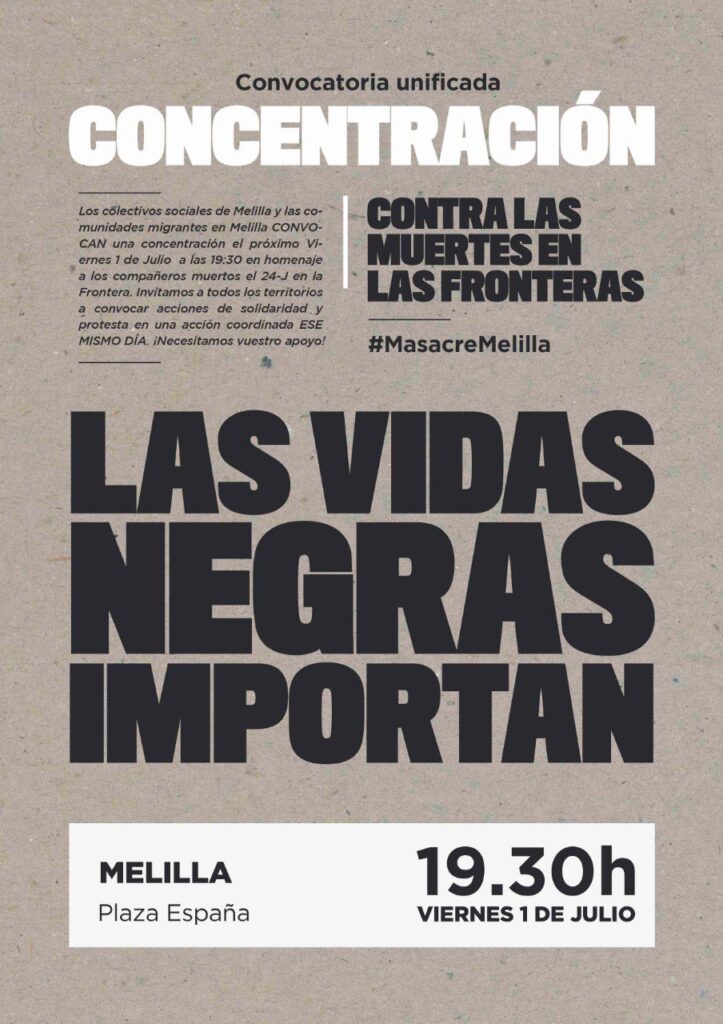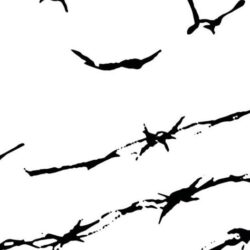(français en bas / english below)

Der folgende Text ist eine gemeinsame Erklärung und eine Verurteilung der Ereignisse am 24. Juni 2022 in Melilla, wo hunderte Menschen von Marrokko aus versucht haben, den Grenzzaun nach Melilla zu überwinden. An diesem Tag hat das rassistisch abschottende europäische Grenzregime weitere 37 Menschenleben gekostet, hunderte mehr wurden verletzt. Das folgende Statement wurde von Kollektiven geschrieben, die vor Ort in Melilla für die Verteidigung der Menschenrechte arbeiten. Es soll die Gewalt an den europäischen Aussengrenzen aufzeigen und verurteilen. Seit dem Massaker in Melilla fanden an vielen Orten international Gedenkveranstaltungen statt.
«Am 24. Juni gab es einen Versuch, den Grenzzaun von Melilla zu überwinden. Nach Angaben der Regierungsdelegation der autonomen Stadt näherten sich etwa 2.000 Personen dem Grenzzaun. 133 von ihnen, die meisten sudanesischer und tschadischer Herkunft, schafften es und befinden sich nun im Zentrum für den vorübergehenden Aufenthalt von Einwanderern (CETI) in Melilla, wo sie isoliert sind, während sie
darauf warten, internationalen Schutz beantragen zu können. Einige andere Personen, denen es gelang, spanisches Hoheitsgebiet zu erreichen, wurden Opfer eines Push-backs und gewaltsam zurückgedrängt, eine Praxis, die gegen die internationalen Menschenrechte verstößt.
Diese Migrationspolitik, verkörpert durch Polizeigewalt und die Militarisierung der Grenzen, hat zum Tod von mindestens 37 Geflüchteten geführt. Die Leichen werden in Nador begraben, ohne dass die für eine eventuelle Untersuchung erforderlichen Autopsien durchgeführt werden, ohne dass sie identifiziert werden und ohne dass ihre Familien informiert werden. Außerdem wurden mehr als 300 Menschen ins Krankenhaus El Hassani in Nador eingeliefert, ohne dass ausreichende Mittel für ihre Versorgung zur Verfügung stehen. All dies ist das Resultat unterlassener Hilfeleistung und der grausamen und
unmenschlichen Behandlung von Geflüchteten.
In den letzten Wochen haben die von marokkanischen Grenzpolizisten ausgeführten Razzien, Verfolgungen und die per Bus an andere Orte Marokkos organisierten Zwangsdeportationen von Migranten, die gezwungen sind, sich in den Wäldern nahe der Stadt Nador niederzulassen, zugenommen. Diese zunehmende Aggression hat zwangsläufig die Art und Weise dieses Versuchs den Grenzzaun zu überwinden beeinflusst.
Dies geschieht vor dem Hintergrund einer angespannten Ruhe zwischen den Regierungen Spaniens und Marokkos. Nach der Ankündigung der spanischen Regierung, die ‹marokkanische Autonomie-Initiative› in der Westsahara-Frage zu unterstützen, trat am 7. April ein Abkommen zwischen Spanien und Marokko in Kraft, das eine verstärkte Zusammenarbeit in Sicherheitsfragen und Verbrechensbekämpfung vorsieht und zur Kriminalisierung von Migration beiträgt. Darüber hinaus besteht der Plan, Ceuta und Melilla unter den Schutz der NATO zu stellen, was zu weiterer Militarisierung, Sicherung und Externalisierung der spanischen Südgrenze beitragen wird.
Die Organisationen und Einzelpersonen, die diese Erklärung unterstützen, STEHEN IN SOLIDARITÄT mit den Familien der 37 Toten, den Opfern von Migrationspraktiken und -politik, die in Wirklichkeit eine Nekropolitik darstellen. Wir VERURTEILEN die Verletzung internationaler Menschenrechtsgesetze, insbesondere der Genfer Flüchtlingskonvention, sowie die Legitimierung von institutionellem Rassismus, der einen Angriff auf schwarze Menschen an der Grenze ist.
Deshalb FORDERN wir
- eine unabhängige Untersuchung zur Klärung der Todesursachen und -umstände, sowie die Rückführung der Opfer in ihre Heimatländer (Identifizierung, Rückführung und Informieren der Familien).
- Zugang zu einer hochwertigen Gesundheitsversorgung und gezielter Pflege für die Verletzten.
- das Ende von Push-backs und die Aufhebung der Reform des Gesetzes „über die Sicherheit der
Bürger“ durch parlamentarische Fraktionen, welche Zurückweisungen an der Grenzen ermöglicht - Mechanismen, die die Einhaltung und den Schutz der Menschenrechte an der gesamten spanischen Südgrenze unter Beachtung der internationalen Abkommen, insbesondere des Flüchtlingsstatuts, und unter Berücksichtigung der besonderen Verletzlichkeit von Minderjährigen, überwachen und garantieren.
- Transparenz in Bezug auf die “neue Phase” der Partnerschaft zwischen Spanien und Marokko sowie die Verwendung der Gelder, die Marokko von der EU und Spanien erhält.
- Schaffung von LEGALEN UND SICHEREN WEGEN und Aufhebung des AUSLÄNDERGESETZES.»
FR: Melilla : le régime frontalier européen tue 37 personnes à nouveau
Le texte suivant est une déclaration commune et une condamnation des événements du 24 juin 2022 à Melilla, où des centaines de personnes ont tenté de traverser la clôture frontalière vers Melilla depuis le Maroc. Ce jour-là, le régime européen de fermeture raciste des frontières a coûté la vie à 37 autres personnes et en a blessé des centaines d’autres. La déclaration suivante a été écrite par des collectifs qui travaillent sur place à Melilla pour la défense des droits de l’homme. Il vise à mettre en évidence et à condamner la violence aux frontières extérieures de l’Europe. Depuis le massacre de Melilla, des commémorations ont eu lieu dans de nombreux endroits au niveau international.
« Le 24 juin dernier, une tentative de saut à la barrière frontalière de Melilla a eu lieu. Selon la délégation du gouvernement de la ville autonome, quelque 2 000 personnes se sont approchées du périmètre frontalier ; 133, pour la plupart d’origine soudanaise et tchadienne, sont arrivées et se trouvent maintenant au Centre de séjour temporaire pour immigrants (CETI) de Melilla, où elles sont isolées dans l’attente d’une demande de protection internationale. De même, certaines personnes qui ont réussi à atteindre le territoire espagnol ont été violemment refoulées à chaud, ce qui constitue une violation du droit international relatif aux droits humains.
Les politiques migratoires, matérialisées dans la brutalité policière et la militarisation des frontières, ont provoqué la mort d’au moins 37 personnes migrantes et réfugiées. Les corps sont enterrés à Nador sans autopsie essentielle pour une éventuelle enquête, sans identification et sans en informer les familles. De même, plus de 300 personnes ont été hospitalisées, faute de ressources suffisantes pour les soigner à l’hôpital El Hassani de Nador. Tout cela à la suite de traitements cruels et inhumains et de l’omission du devoir de secours
Au cours des dernières semaines, la gendarmerie a intensifié au Maroc les rafles, les persécutions et les déplacements forcés dans des autobus contre les communautés migrantes qui sont obligées de s’installer dans les forêts près de la ville de Nador. Cette hostilité croissante a inévitablement influencé la nature de ce saut.
Cela se passe dans un contexte de calme tendu entre les gouvernements espagnol et marocain. Après l’annonce par l’exécutif espagnol de son soutien à ‹ l’initiative d’autonomie marocaine › sur la question du Sahara occidental, un accord entre l’Espagne et le Maroc est entré en vigueur le 7 avril dernier dans le but d’accroître la coopération en matière de sécurité et de lutte contre la criminalité en contribuant à criminaliser les migrations. Il est également prévu d’inclure Ceuta et Melilla sous la protection de l’OTAN, ce qui contribuera à la militarisation, à la sécurisation et à l’externalisation, encore plus, de la frontière sud.
Les entités et les personnes qui soutiennent ce communiqué NOUS SOLIDARISONS avec les familles des 37 personnes décédées, victimes des pratiques et des politiques migratoires qui se traduisent réellement en nécropolitiques. NOUS DÉNONÇONS la violation du droit international relatif aux droits humains, notamment la Convention de Genève relative au statut des réfugiés, ainsi que la légitimation du racisme institutionnel qui agresse les corps noirs à la frontière.
C’est pourquoi nous EXIGEONS:
- Une enquête indépendante visant à élucider les décès survenus ; ainsi que la réparation des victimes (identification, rapatriement et information des familles).
- L’accès à des soins de santé de qualité et à des soins spécialisés pour les personnes blessées.
- Fin des renvois à chaud et abrogation, par les groupes parlementaires, des rejets à la frontière de la réforme de la Loi sur la Sécurité Citoyenne.
- La protection, la garantie et les mécanismes de surveillance des droits humains le long de la frontière sud, dans le respect des accords internationaux, en particulier le statut des réfugiés, et en tenant compte de la vulnérabilité particulière des mineures.
- Transparence en ce qui concerne la « nouvelle étape » du partenariat entre l’Espagne et le Maroc ; ainsi que sur la façon dont l’argent que le Maroc reçoit de l’UE et de l’Espagne est dépensé.
- Établissement de VOIES LÉGALES et SÛRES et ABROGATION de la LOI SUR LES ÉTRANGERS.”
EN: Melilla: European border regime kills another 37 people
The following text is a joint statement and condemnation of what happened on June 24, 2022 in Melilla, where hundreds of people tried to cross the border fence into Melilla from Morocco. On that day, the racist-segregating European border regime cost another 37 lives, and hundreds more were injured. The following statement was written by collectives working on the ground in Melilla to defend human rights. It aims to highlight and condemn the violence at Europe’s external borders. Since the massacre in Melilla, commemoractions have taken place in many places internationally.
“On June 24, there was an attempt to jump the Melilla fence. According to the Government Delegation of the autonomous city, some 2,000 people approached the vicinity of the border perimeter; 133, mostly of Sudanese and Chadian origin, managed to arrive and are now in the Temporary Stay Center for Immigrants (CETI) of Melilla, where they are isolated while waiting to apply for International Protection. In addition, some people who managed to reach Spanish territory were violently pushed back, a practice that violates international human rights legislation.
Migration policies, embodied by police brutality and border militarization, have resulted in the deaths of at least 37 people on the move. The bodies are being buried in Nador without carrying out autopsies essential for a possible investigation, without identification and without informing the families. Likewise, more than 300 people were hospitalized, with insufficient resources to care for them at the El Hassani hospital in Nador. All this, as a result of cruel and inhuman treatment and the failure to provide assistance.
In recent weeks, raids, persecutions and forced displacements on buses in Morocco, on the part of the border patrol against migrant communities forced to settle in the forests near the city of Nador, have intensified. This growing hostility has inevitably influenced the nature of this jump.
This takes place in a scenario of tense calm between the governments of Spain and Morocco. Following the announcement of the Spanish government showing support for the ‘Moroccan autonomy initiative’ on the Western Sahara issue, an agreement between Spain and Morocco came into effect on April 7th with the intention of increasing cooperation in security matters and the fight against crime contributing to criminalizing migrations. There is also the intention to include Ceuta and Melilla under NATO protection, which will contribute even more to the militarization, securitization and externalization of the southern border.
The organizations and individuals who support this statement, STAND IN SOLIDARITY with the families of the 37 dead people, victims of migratory practices and policies that really translate into necropolitics. WE DENOUNCE the violation of international legislation on human rights, especially the Geneva Convention on the Status of Refugees, as well as the legitimization of institutional racism that assaults black bodies at the border.
Therefore, we DEMAND
- Independent investigation to clarify the deaths that occurred; as well as, the reparation of the victims (identification, repatriation and information to the families).
- Access to quality healthcare and specialized care for the injured.
- The end of pushbacks and the repeal, by the parliamentary groups, of rejection at the border in the reform of the Law on Citizen Security.
- Protection, guarantee and monitoring mechanisms of Human Rights throughout the Southern Border, respecting international agreements, especially the Statute of Refugees, and taking into account the particular vulnerability of minors.
- Transparency in relation to the “new stage” of partnership between Spain and Morocco; as well as how the money received by Morocco from the EU and Spain is spent.
- Establishment of LEGAL AND SAFE WAYS and REPEAL OF THE FOREIGNER’S LAW.”
